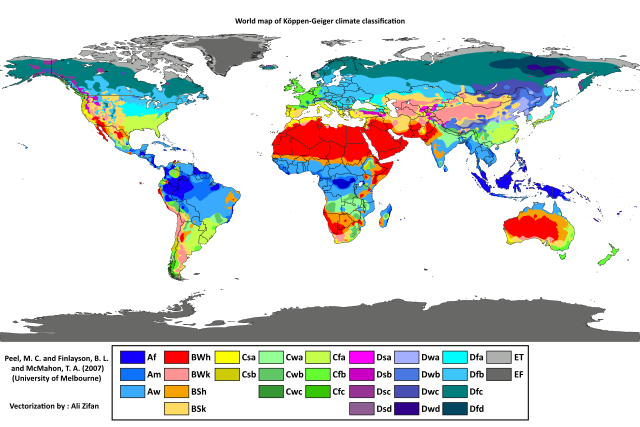Loading AI tools
Climate change article. [1] I searched for spelling errors and links not working, and found no errors. All links clicked worked properly. I think there is a good balance of information and sources were sited.
 | This is a user sandbox of Samanthadawson16. You can use it for testing or practicing edits. This is not the sandbox where you should draft your assigned article for a dashboard.wikiedu.org course. To find the right sandbox for your assignment, visit your Dashboard course page and follow the Sandbox Draft link for your assigned article in the My Articles section. |
Wladimir Koppen was born in St. Peterburg, Russia and lived there until he was 20 years old. He died in Graz, Austria. Köppen's grandfather was one of the German physicians invited to Russia by Empress Catherine II to improve sanitation in the provinces, and he later became a personal physician to the tsar. His father, Pyotr Köppen, was a noted geographer, historian and ethnographer of ancient Russian cultures, and an important contributor to intellectual exchanges between western European slavists and Russian scientists. Wladimir attended secondary school in Simferopol, Crimea and began his studies of botany in 1864 at the University of St. Petersburg.
He frequently travelled to his family's estate on the Crimean coast from St. Petersburg and to and from Simferopol, in the interior of the peninsula. The floral and geographical diversity of the Crimean peninsula, as well as the starker geographical transitions between the capital and his home, did much to awaken an interest in the relationship between climate and the natural world. In 1867, he transferred to the University of Heidelberg and defended his doctorate dissertation on the effects of temperature on plant growth at the University of Leipzig in 1870. Following the Franco-Prussian War (1870–71), in which he served in the ambulance corps, Köppen returned to St. Petersburg as assistant at the Central Physical Observatory.
Wladimir Koppen was born in St. Peterburg, Russia and lived there until he was 20 years old. He died in Graz, Austria. Köppen's grandfather was one of the German physicians invited to Russia by Empress Catherine II to improve sanitation in the provinces, and he later became a personal physician to the tsar. His father, Pyotr Köppen, was a noted geographer, historian and ethnographer of ancient Russian cultures, and an important contributor to intellectual exchanges between western European slavists and Russian scientists. Wladimir attended secondary school in Simferopol, Crimea and began his studies of botany in 1864 at the University of St. Petersburg.
He frequently travelled to his family's estate on the Crimean coast from St. Petersburg and to and from Simferopol, in the interior of the peninsula. The floral and geographical diversity of the Crimean peninsula, as well as the starker geographical transitions between the capital and his home, did much to awaken an interest in the relationship between climate and the natural world. In 1867, he transferred to the University of Heidelberg and defended his doctorate dissertation on the effects of temperature on plant growth at the University of Leipzig in 1870. Following the Franco-Prussian War (1870–71), in which he served in the ambulance corps, Köppen returned to St. Petersburg as assistant at the Central Physical Observatory.
He identified five major climatic groups, which correspond with the five main vegetation groups:
- Tropical rainy climate
- Dry climate
- Warm temperature rainy climate
- Snowy and cold climate
- Polar climate
Wikiwand in your browser!
Seamless Wikipedia browsing. On steroids.
Every time you click a link to Wikipedia, Wiktionary or Wikiquote in your browser's search results, it will show the modern Wikiwand interface.
Wikiwand extension is a five stars, simple, with minimum permission required to keep your browsing private, safe and transparent.
